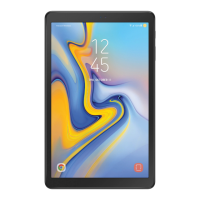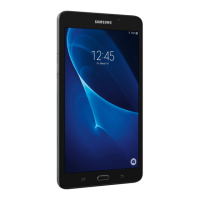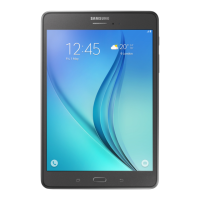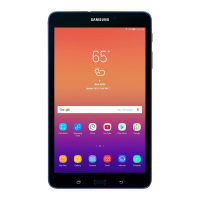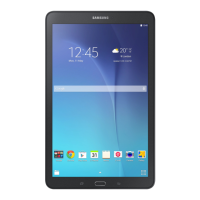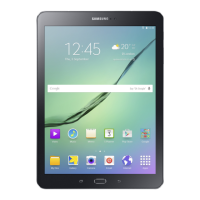Do you have a question about the Samsung SM-A325M and is the answer not in the manual?
Important introductory information and warnings before using the device.
Explains the meaning of icons used throughout the manual for guidance.
Discusses causes of device overheating and provides solutions to manage it.
Safety precautions to prevent device overheating and potential damage.
Guidance on avoiding hazardous environmental conditions that can affect the device.
Details the physical components and their primary functions on the device.
Explains the function of physical buttons like the Side key and Volume Down key.
Describes the on-screen navigation buttons (Recents, Home, Back) and their functions.
Covers battery charging procedures, tips, and important precautions for safe charging.
Instructions on how to use the fast charging feature for quicker battery replenishment.
Tips and settings to conserve battery power for extended device usage.
Instructions on how to insert and manage SIM/USIM cards, including dual SIM functionality.
Guide on installing, removing, and formatting microSD cards for expanded storage.
Step-by-step instructions for powering the device on, off, and performing a forced restart.
Explains how to activate and use emergency mode for battery conservation and essential functions.
Guides users through the initial configuration process when setting up the device for the first time.
Information on creating, signing in, and managing a Samsung account for device services.
Details on using Samsung Smart Switch to migrate data from an old device to the new one.
Explains how to interact with the touchscreen, including gestures like tap, drag, and swipe.
Describes the functions of the on-screen navigation buttons and how to hide them.
Explains the difference between the Home and Apps screens and how to navigate between them.
How to quickly search for content on the device using the Finder feature.
How to organize apps into folders for easier access and management.
Covers managing the lock screen, changing lock methods, and related security settings.
Explains common icons that appear in the status bar for device status and notifications.
Instructions on how to capture screenshots using different methods and available options.
How to view and manage notifications, and use quick setting buttons.
Covers keyboard layout, changing input language, and text entry methods.
Guide on downloading, installing, and removing applications from the device using app stores.
Explains how to manage app permissions to control access to device features and data.
Instructions for making and receiving calls, using speed dial, and managing call options.
How to add, import, search, share, and manage contacts on the device.
Guide on sending, viewing, and managing text messages and conversations.
Instructions for browsing the web, bookmarking pages, and using secret mode.
Comprehensive guide on taking photos and videos, including various modes and settings.
How to view, manage, edit, and share photos and videos stored on the device.
Features for augmented reality, including AR Emoji creation and AR Doodle.
Using split screen and pop-up view to run multiple apps simultaneously.
Managing wellness and fitness goals, tracking activity, and viewing health tips.
Creating, editing, and managing notes, including inserting files and voice recordings.
Information on accessing customer support, community features, and tips for the device.
Accessing the Samsung website for product information and purchases.
Managing wearable devices connected to the smartphone.
How to manage schedules, create events, and sync with accounts.
Setting, completing, restoring, and deleting reminders for tasks and events.
Instructions for using the FM radio app, including recording and playing through the speaker.
Recording and playing voice memos, including bookmarking and saving.
Accessing and managing files and folders stored on the device.
Setting alarms, checking time, and using timers and stopwatches.
Performing calculations, unit conversions, and using the scientific calculator.
Organizing and launching games, and managing performance modes for gaming.
Enhancing the gaming experience with features like priority mode and screen touch lock.
Setting up a safe environment for children with parental controls and usage limits.
Controlling and managing smart home appliances and IoT devices.
Sharing photos and other content with nearby devices or via web links.
Sharing content with nearby devices using Wi-Fi Direct or Bluetooth.
Sharing large files via a web link by uploading to Samsung storage.
Sharing Bluetooth speaker audio with another person or listening together with Galaxy Buds.
Mirroring the device's screen content to a TV or monitor.
Connecting the device to a Windows PC for file access and notifications.
Information about global goals and how the device can contribute to them.
Overview of Google applications like Chrome, Gmail, Maps, and YouTube available on the device.
Managing your Samsung account for device services and synchronization.
Configuring network connections like Wi-Fi, Bluetooth, and NFC.
Connecting to Wi-Fi networks, viewing network quality, and sharing passwords.
Pairing with Bluetooth devices, sending/receiving data, and troubleshooting connection issues.
Using NFC for reading tags and making contactless payments.
Reducing mobile data usage by limiting background app activity and compressing data.
Selecting apps that exclusively use mobile data, even when connected to Wi-Fi.
Sharing the device's mobile data connection with other devices via a hotspot.
Advanced network settings including VPN, Private DNS, and Ethernet.
Configuring printer settings and adding printer plug-ins for wireless printing.
Customizing sound modes, ringtones, notification sounds, and vibration settings.
Adjusting audio settings like Dolby Atmos and equalizer for improved sound experience.
Playing media sound from different apps on separate audio output devices.
Managing notification settings, pop-up styles, and 'Do not disturb' modes.
Adjusting screen settings like brightness, dark mode, motion smoothness, and screen zoom.
Changing screen refresh rate for smoother scrolling or better battery life.
Customizing display color modes (Vivid, Natural) and adjusting color balance.
Changing the background image for the Home and Lock screens.
Customizing the device's visual appearance with themes, icons, and wallpapers.
Configuring the layout and appearance of the device's Home screen.
Customizing the locked screen, including screen lock types, widgets, and shortcuts.
Automatically unlocking the device based on trusted locations or devices.
Displaying information like clock and notifications on the screen when it's off.
Setting up security features like face recognition, fingerprints, and Samsung Pass.
Registering and using facial data to unlock the device and authenticate apps.
Registering and using fingerprints for device unlock and app authentication.
Managing biometric data for easy sign-in to websites and apps.
Creating a private, encrypted space for sensitive content and apps.
Managing privacy settings, permissions, and personal data.
Configuring location services and app permissions for location access.
Managing accounts, backing up data to Samsung Cloud, and using Google Drive.
Backing up and restoring device data and settings using Samsung Cloud.
Activating and configuring advanced device functionalities like Call & text on other devices.
Using device motions and gestures for shortcuts and actions like lift-to-wake.
Using two separate accounts for the same messenger app.
Monitoring device usage, setting app timers, and managing children's digital activity.
Optimizing device performance, checking battery status, storage, and security.
Checking battery status, enabling power saving modes, and managing background usage.
Managing device storage, deleting files, and uninstalling apps.
Freeing up device memory by closing background apps.
Scanning the device for malware and checking security status.
Reducing mobile data usage by compressing internet data.
Managing installed applications, their settings, and usage.
Customizing system settings like language, date/time, and keyboard.
Configuring settings to improve device usability for users with disabilities.
Updating the device's software and checking for the latest security patches.
Accessing device information, status, legal details, and software versions.
Solutions for common device problems like lock codes, network errors, and freezing.
Information regarding the device's compatibility with hearing aids according to FCC regulations.
| Battery | 5000 mAh, non-removable |
|---|---|
| Charging | 15W wired |
| RAM | 4GB |
| Storage | 64GB/128GB |
| Operating System | Android 11 |
| Colors | Black, White, Blue, Violet |


